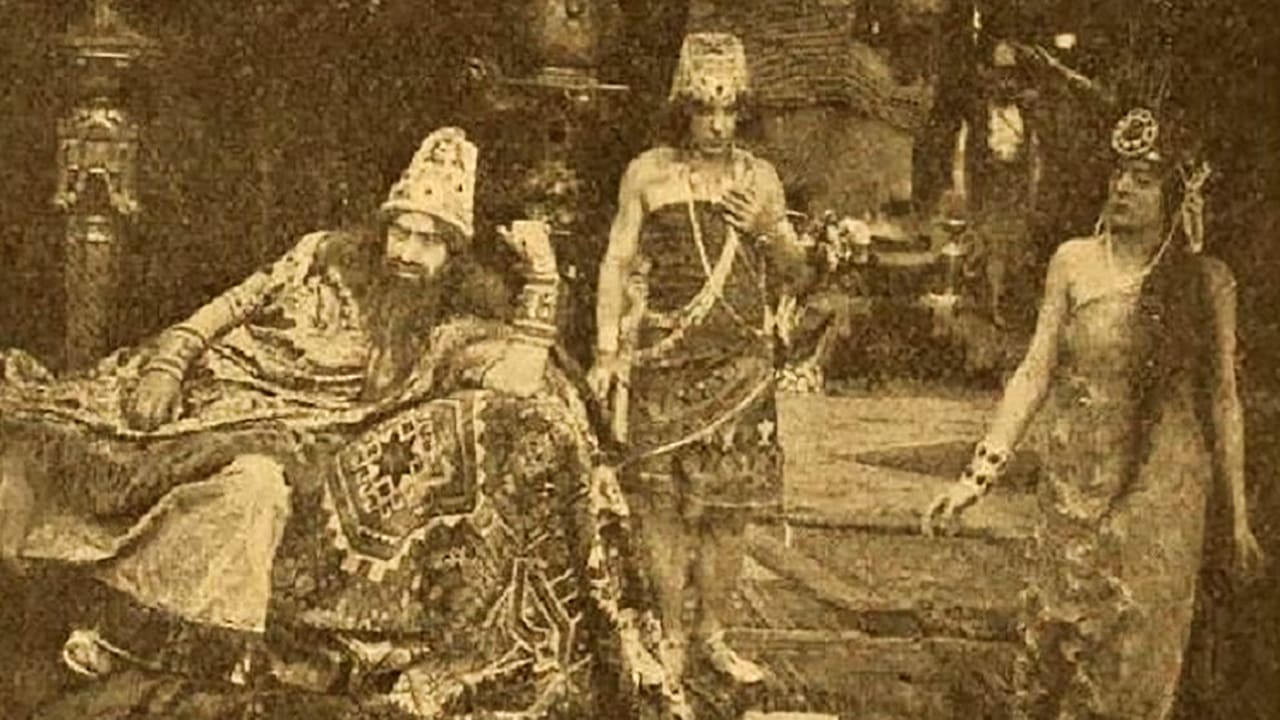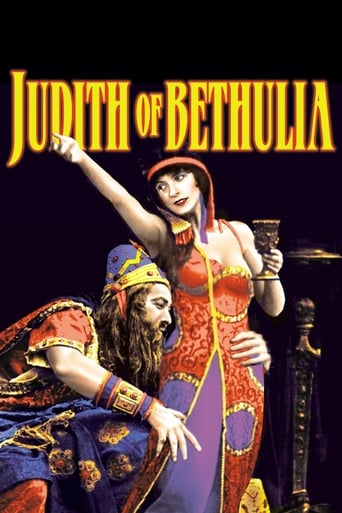

The Biograph company has taken the original four reels and to those from the hundred and fifty thousand feet of exposed negative have added two reels. New sub-titles have been given the whole production. These are unusual in their artistry. Over dark atmospheric backgrounds, selected from the negative, sub-titles have been imposed. The effect is striking. Out of regard for the opinions of exhibitors, many of whom had complained that "Judith of Bethulia" as a title lacked those psychological qualities of appeal for which showmen as a class have such a keen sense, the enlarged production is issued under the name of "Her Condoned Sin." As the reissued picture treats of a Biblical period, not of to-day, it is under no handicap such as follows upon the bringing out of the vaults of a story where the characters are arrayed in a garb that was up to date a few years previously. Another fact that will impress itself upon the observer is that after all we have gained little if at all in a photographic way in the past three years. The photography of "Her Condoned Sin" is of the best. The whole subject is tinted and toned in a most effective combination of amber and light sepia. This treatment, together with the new titling, enhances the pictorial quality of a subject that at the time it was first presented to the public was conceded by many in a position to speak authoritatively to be the best all-around product of an American studio. - The Moving Picture World, February 3, 1917
... View MoreGod knows Judith of Bethulia (1914) makes for easier viewing than what is usually regarded as D.W. Griffith's first feature, The Birth of a Nation (1915). On its own merits, this is a decent little film with a good performance from Blanche Sweet in the titular role.The original biblical tale is expanded upon, most notably by adding a subplot with two lovers separated when one is made a captive of the enemy and by having Judith fall in love with Holofernes, the man she is sent to seduce and assassinate. These are good additions, I think, especially the latter. It helps give more depth to the tale and the titular heroine herself.Birth is more ambitious and experimental, but I much prefer Judith. It seems more assured of itself (most likely due to having less scale and running time) and I adore Blanche Sweet, who never achieved the level of stardom she deserved. Plus it's not, you know, horribly racist.
... View MoreSince it is Easter time, Herr Graf's curiosity about strange Christians' pious habits led to a decision to watch a film inspired lightly by or based on religious scenes ( although aristocrats don't share any Christian feelings about their fellow men at this time or any other time of the year ). For this reason "Judith Of Bethulia" was chosen, a film located in Bethulia, a village near Jerusalem, so it was perfect penance for this German aristocrat. "Judith Of Bethulia" was the last film directed by Herr D.W. Griffith for "Biograph Studios" because the American director had a strange idea about how many reels were necessary to depict a story, an opinion about film running time that the company didn't share ( afterwards Herr Griffith would take revenge and put his theory in practice in his well-known and longer silent films ). The film is the story of Damen Judith, a widower who, in order to save her city from the Assyrian invaders and the thirst and famine that her countrymen suffer in the besieged city, sacrifices her virtue to Herr Holofernes, the invading leader."Judith Of Bethulia" is a film in which the techniques are recognizable which made the American director famous in the silent world, even though this film exposes them in a subtle way: not forgetting the pace, the perfectly entwined shots and situations, the strong male characters that Herr Griffith was so fond of, and the fragile and self-sacrificing little fräuleins so characteristic of his cinema. This film is not remarkable but perfect ( clean, even antiseptic ) in its technical, formal and performing aspects.And now, if you'll allow me, I must temporarily take my leave because this German Count must sacrifice himself to one of his devoted fat German heiresses.Herr Graf Ferdinand Von Galitzien http://ferdinandvongalitzien.blogspot.com/
... View MoreD.W. Griffith fuses Thomas Bailey Aldrich's long poem of Judith's story with its basis in the Apocrypha to derive this somewhat austere and powerful film of the widow's noble sacrifice to save her besieged city and its inhabitants from an invading Assyrian army, led by Holofernes. With JUDITH as Griffith's first feature length effort, he turns away from the commercial needs of the Biograph Company, the management of which desires to maintain its policy of making only one and two reelers, and his expenditure of $36000 is double the amount budgeted, reflecting his expanded use of sets and extras and providing the requisite exercise in preparation for his next major work: BIRTH OF A NATION, made as a free agent. Eighteen year old Blanche Sweet's performance is striking as she utilizes all of her wide range of expressivity, uncommon in one so young, to mirror the emotions of a woman who is physically attracted to a man, Henry Walthall as Holofernes, toward whom her only possible final act will be his death by her hand, as depicted in many a well-known painting. The supporting cast serves the sparsely titled production well, with emotional performances from Mae Marsh and Robert Harron as endangered lovers, and among the many bit players who animate the work may be seen Lionel Barrymore, Harry Carey, Antonio Moreno and Lillian and Dorothy Gish as victims of the invaders. This version is the four reeler rather than the one of six reels released later and is Griffith's answer to the full-length epics which were being imported from Europe; its release was delayed a year by Biograph to ensure that the director had left its employ, but this brought scant gain to the company: Biograph was soon defunct, while Griffith's star was rising.
... View More